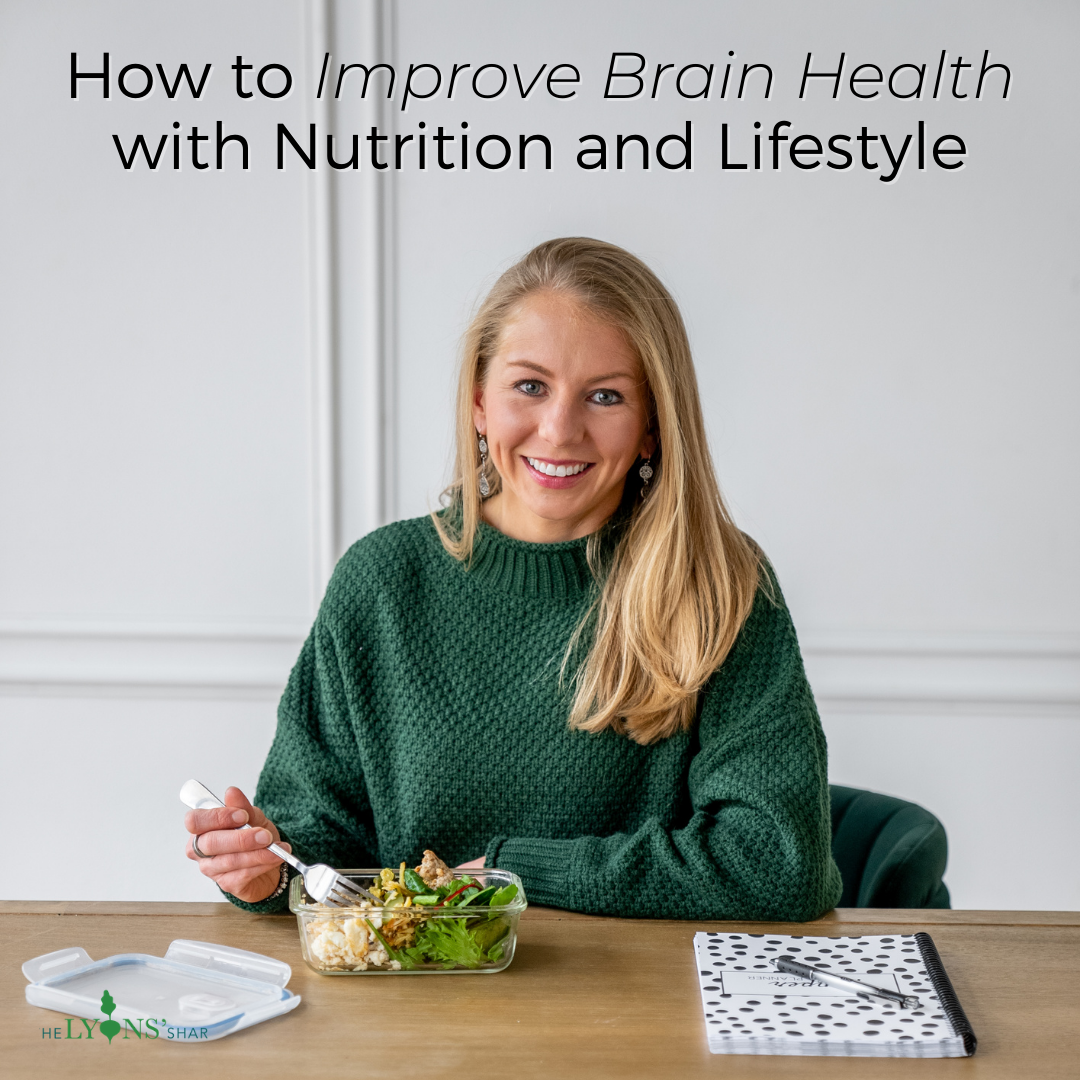I’m frequently asked how to improve brain health with nutrition, and the short answer is that everything I teach about overall health, from stress management to increasing vegetables, will all support a healthy brain. Our bodies operate as interconnected systems, so it’s not like eating a blueberry (or anything else) goes straight to your brain and makes it healthier automatically. It’s much more complicated than that. But, as always, I’m here to make healthy living simple and actionable, so today, I’ll discuss nutrition and lifestyle tips for overall brain health, for mood regulation, for chronic disease prevention, and for brain fog and memory enhancement.
Nutrition and Lifestyle Tips for Overall Brain Health
There are 7 main categories of nutrition and lifestyle tips for brain health, and 4 of them come from this simple quote from “Brain Maker: The Power of Gut Microbes to Heal and Protect Your Brain – for Life,” a book by Dr. David Perlmutter, one of the nation’s leading experts on brain health. I highly recommend this book, as well as his follow-up book, “Grain Brain: The Surprising Truth About Wheat, Carbs, and Sugar – Your Brain’s Silent Killers”. Here’s the quote:
“A diet that keeps blood sugar balanced keeps gut bacteria balanced. A diet high in rich sources of fiber, which you’ll get from whole fruits and vegetables, feeds the good gut bacteria and produces the right balance of those short chain fatty acids to keep the gut lining in check. A diet devoid of injurious gluten will further tip the scales in favor of healthy gut ecology as well as brain physiology. And a diet that’s intrinsically anti-inflammatory is good for the gut and the brain.”
With that quote in mind, let’s dive into the 7 tips.
- Keep Blood Sugar Balanced
We know that sugar is detrimental for the body overall, and many of its negative repercussions impact brain health. This study shows that sugar causes similar neurochemical changes in the brain as drug addiction!

Keeping blood sugar stable also impacts memory function. A study published in the journal Neurology found that for every 0.6 percent increase in A1C (which is a measure of blood sugar stability over the previous 3 months), two fewer words were recalled on a memory test, and that those with higher A1Cs (not a good thing) had less hippocampal volume. The hippocampus is the brain’s memory processing center. So unstable blood sugar literally changes not only the function, but also the structure of the brain!
So how do we keep our blood sugar balanced? The short answer is to reduce the added sugar in our diets, and to balance the carbohydrates we do choose to eat with adequate protein and healthy fat. For a more in-depth answer, check out this post on how to balance blood sugar!
- Increase vegetables and whole, low-sugar fruits.
Vegetables are brain foods. Plain and simple. Particularly the dark, leafy green varieties, but really any kind of non-starchy vegetable will have benefit for brain health. They are loaded with vitamins, minerals, and phytonutrients that the brain relies on for optimal functioning. Minerals like folate, magnesium, and other nutrients like sulforaphane and fiber, are critical for brain health, and are found in abundance in dark green (and other non-starchy vegetables). Load up!
Some fruits, like coconut, avocado, olives, and cacao (yes! That’s a fruit!) have excellent benefits for the brain. Berries of all kinds are also high in antioxidants and can slow effects of aging and boost memory. The Nurses’ Health Study showed that the brains of those study participants who ate the most berries looked 2.5 years younger!

That said, some of the higher sugar fruits (like mango, dates, banana, melons, and pineapple) are likely to spike blood sugar, and we know from #1 that this isn’t ideal. This is likely why studies show no correlation between overall fruit intake and dementia risk – the benefit of nutrients from low-sugar fruits like berries is cancelled out by the detriment of blood sugar spiking from higher sugar fruits.
- Reduce or eliminate gluten and harmful additives.
While very few people (about 1-3% of the population) have Celiac disease, almost everyone has a negative, sometimes asymptomatic, inflammatory reaction to gluten. Brain Maker says, “gluten sensitivity – with or without the presence of celiac – increases the production of inflammatory cytokines, which are pivotal players in neurodegenerative conditions. And … the brain is among the most susceptible organs to the deleterious effects of inflammation.”
In my experience with clients, one of the most unexpected benefits of reducing gluten is the virtual elimination of brain fog!
An abundance of gluten will negatively impact brain health. For more on going gluten-free (and whether it’s all “hype”), see this post.
As far as other things to avoid, the list is sadly long. So many of the additives our food manufacturing system uses today are detrimental to brain health. Pesticides, herbicides, nitrates, nitrites, BHT, BHA, artificial sweeteners, artificial colorings, antibiotics, hormones, and more all wreak havoc on our brains. The best thing you can do here is eat food as close to how it was grown as possible. If the ingredient list on a packaged food item is long and filled with words that sound like chemicals, do your best to choose another option.
- Eat an anti-inflammatory diet.
We’ve long known that inflammation is linked to chronic conditions like Alzheimer’s disease and dementia, and it now appears that inflammation is at the root of most cognitive decline. A 2020 study published in Neurology showed that those participants with the highest levels of inflammation had 7.8% greater cognitive decline than those with lowest inflammation.
An anti-inflammatory diet is rich in vegetables, healthy fats, and lean proteins, and reduces gluten, fried food, dairy, added sugar, processed and refined foods, and alcohol. For more on inflammation, see this post. And to hear more about how inflammation is connected to chronic brain disease, check out this podcast.
- Enjoy healthy fat, and don’t keep cholesterol too low.
That’s not a typo! Again from Brain Maker, “people with low cholesterol are at much greater risk for neurological problems from depression to dementia.” Our brains are in fact more than half fat in composition and rely upon healthy fats for optimal fuel. Healthy fats like seeds (chia, flax, pumpkin, sunflower, and others), fish, olives, olive oil, coconuts, coconut oil, avocados, and eggs are great for brain health. Plus, a very low-fat diet can reduce cholesterol, which is critical for numerous functions of the human body. See this post for more on whether or not you should lower cholesterol, and how to impact the main components of cholesterol (HDL, LDL, and triglycerides).

- Load up on brain-boosting superfoods.
The book “Genius Foods: Become Smarter, Happier, and More Productive While Protecting Your Brain for Life” contains tons of great information on brain health and several foods that promote it. The book “Food: What the Heck Should I Eat?” doesn’t center around brain health, but also has great recommendations that support it. Here are a few of my favorite brain-boosting superfoods:
- Fish, especially fattier fish like salmon. Fish are the most abundant source of omega-3 fatty acids that protect against inflammation, autoimmune disease, and depression.
- Olive oil. Olive oil is a staple in the Mediterranean diet, which has been linked to lower incidence of diseases like Alzheimer’s because it helps clear the amyloid plaque that aggregates in the disease. The antioxidants and polyphenols in olive oil can even help reverse age- and disease-related changes to the brain.
- Avocados are rich in vitamins B, C, K, and folate, and have been linked to improved cognitive function, increased memory, and better concentration.
- Chocolate. 2012 research shows that those who consumed the most flavanols from cocoa (note: this doesn’t mean Twix bars! It means low-sugar, high-quality chocolate!) improved their insulin sensitivity and blood pressure, showed less free radical damage, and had improved cognitive function. Other studies show improved blood flow to the brain and numerous other benefits from enjoying cocoa.
- Probiotics. Gut health is intimately linked to brain health via the gut-brain connection. Probiotic-rich foods like live cultured yogurt, kefir, kombucha, tempeh, kimchi, sauerkraut, pickles, pickled vegetables support gut health, which in turn supports brain health. For more on probiotics, see this post.
- Vegetables, including dark leafy greens (see #2 above).
- Low-sugar fruits like berries (see #2 above).

- Reduce stress and practice soothing techniques like meditation or yoga.
I explore many of the benefits of meditation in this post. Here’s an excerpt from that post:
Meditation is such a powerful brain booster that studies have shown it actually lengthens telomeres, which are structures at the end of chromosomes that are linked to high stress and accelerated aging. Other studies show significant improvements on attention, memory, and general cognition in aging individuals, and even improvements in the brain function of those with Alzheimer’s.
Simply put, your brain isn’t designed to operate on overdrive 24/7. Giving it a break from the screen, getting out in nature, and focusing on calming practices like yoga and meditation not only feel good in the moment, but will improve your long-term brain health.
Now it’s your turn … Which of these tips was most surprising to you? What is the best thing you do for your brain health?


0 Comments